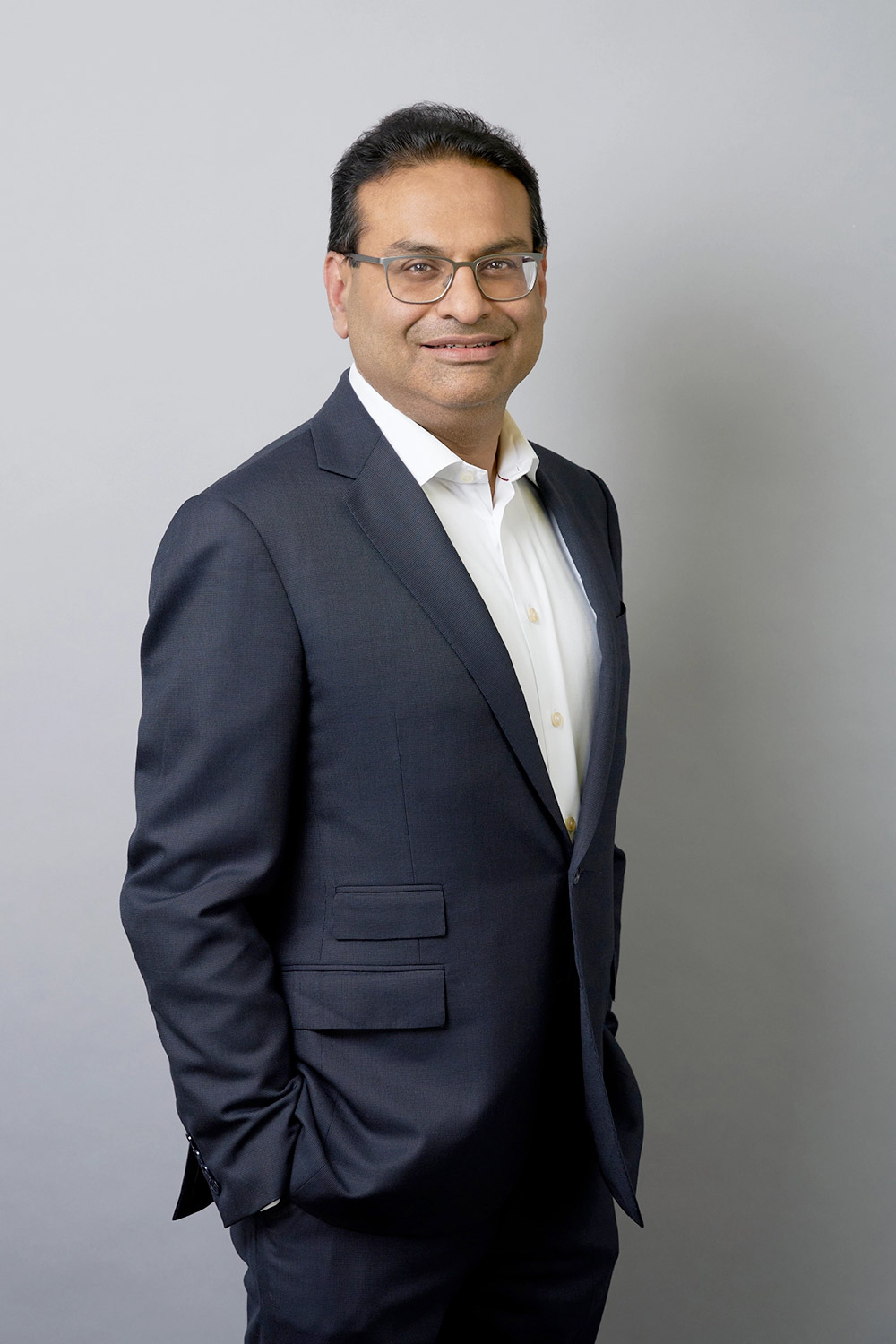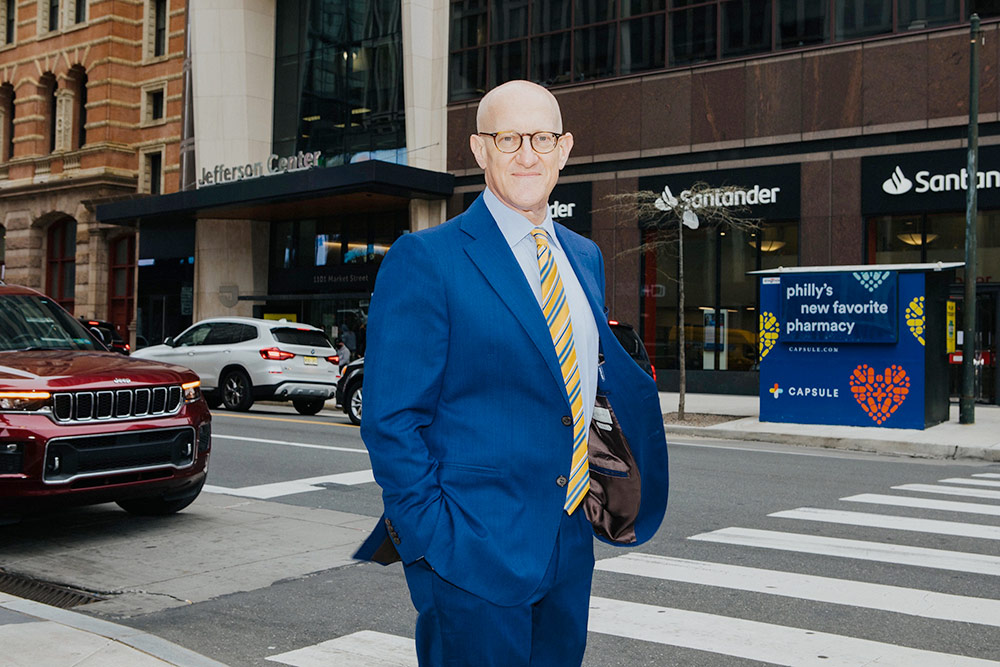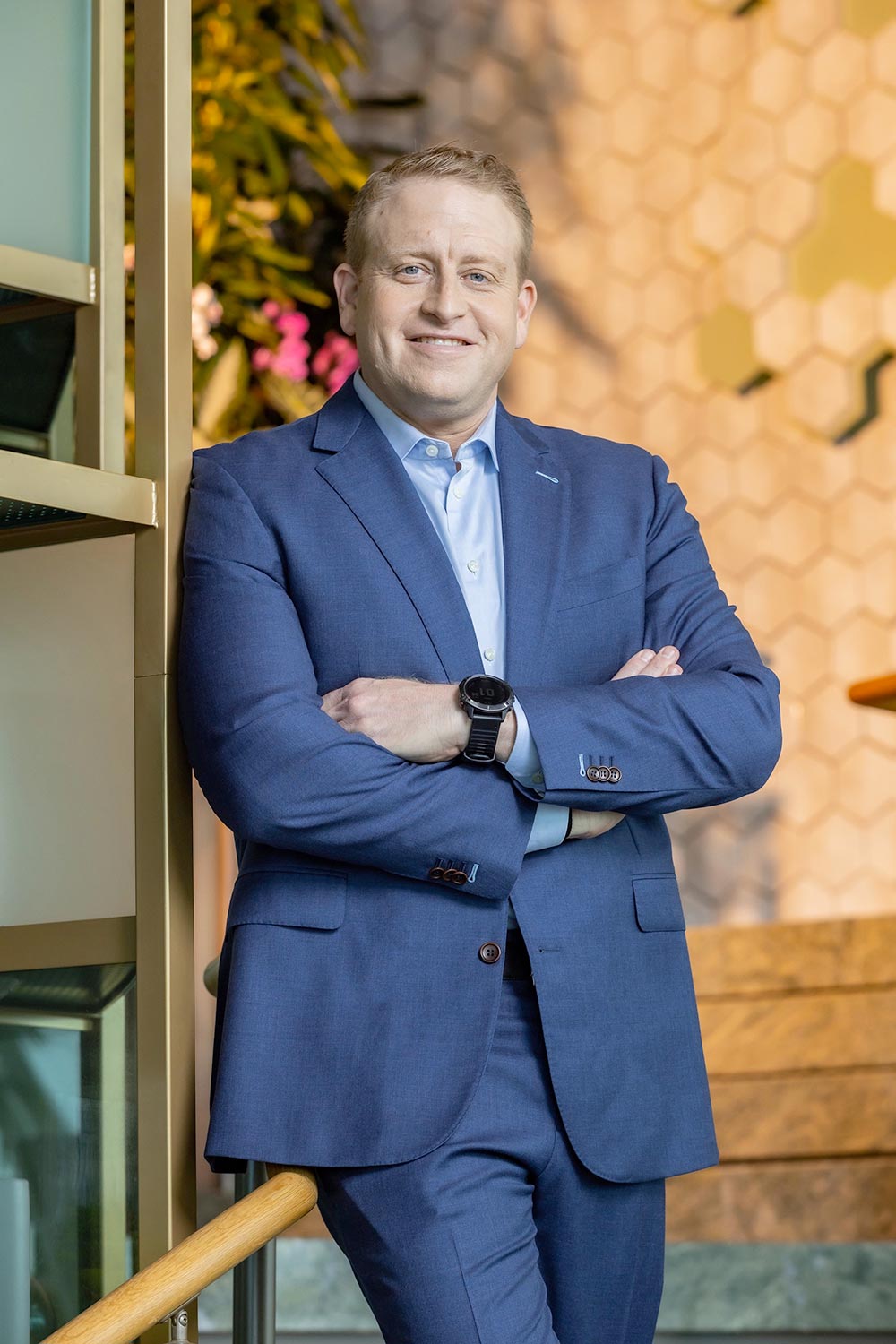要說疫情期間各公司首席執(zhí)行官的工作職責(zé)是什么,你可能想象不到這個故事開頭,。這是利潔時集團(tuán)(Reckitt Benckiser Group)的拉克斯曼·納拉西姆漢和同事開視頻會的故事,。該集團(tuán)總部位于英國,,主要生產(chǎn)清潔和個人護(hù)理產(chǎn)品,旗下品牌包括Lysol,、Woolite,、Clearasil等。拉克斯曼畢業(yè)于沃頓商學(xué)院,,曾在麥肯錫(McKinsey)任合伙人,,會說多種語言。就在疫情爆發(fā)前幾個月,,他才被任命為該公司首席執(zhí)行官,,期待他能帶領(lǐng)公司扭轉(zhuǎn)局面。當(dāng)時,,納拉西姆漢在他位于倫敦西區(qū)的公寓里,,正在策劃公司的一次重要戰(zhàn)略轉(zhuǎn)型,涉及價值數(shù)十億美元的品牌買賣,。
就在這時,,他79歲的母親走進(jìn)了鏡頭里,對他說:“抱歉打擾,,但你沒把垃圾拿出去,。”
他做了作為兒子唯一能做的選擇:暫停會議,,倒垃圾,。

今天再回頭看,,納拉西姆漢將那一刻視為恩賜,。正是那一刻,他理解了各行各業(yè)和世界各地的首席執(zhí)行官們會在接下來的兩年里認(rèn)識到的重要一點,?!拔野l(fā)現(xiàn),對于組織而言,,做到超級接地氣十分重要,。”他說,,“讓人們看到真實的你,,看到你面對的所有弱點,。”
疫情改變了首席執(zhí)行官的職責(zé),,這種改變往往與領(lǐng)導(dǎo)者的傳統(tǒng)角色存在天然沖突,,他們不得不做出極大的改變。他們本應(yīng)該見多識廣,、準(zhǔn)備充分,、牢牢控制局面,不應(yīng)該有弱點,。他們應(yīng)該樂觀自信,。智睿咨詢有限公司(Development Dimensions International)的高管兼首席執(zhí)行官培訓(xùn)師馬特?佩斯表示:“成為首席執(zhí)行官意味著,除了必須做好本職工作外,,還必須演好人設(shè),。”但在這場百年一遇的危機(jī)里,,沒有劇本,,他們有時不得不放棄人設(shè)。
高管獵頭公司史賓沙(Spencer Stuart)的吉姆?西特林表示,,廣泛說來,,“首席執(zhí)行官們從像神一樣變得更有人情味了?!痹谝咔楸l(fā)后的前六個月,,西特林與100多名首席執(zhí)行官進(jìn)行交談。他們花了大量時間來處理員工的情感需求,,盡管并非所有人都擅長此道,。“有兩種趨勢出現(xiàn)了融合,?!蔽魈亓直硎荆摆厔菀皇钦J(rèn)識到目標(biāo)的重要性,,10年前就開始了,,但最近加速了,首席執(zhí)行官們對此進(jìn)行了深入挖掘,。另外一種趨勢是,,開始允許首席執(zhí)行官展現(xiàn)真實和真我,保持透明,?!逼渌P(guān)注該領(lǐng)域的咨詢師、教授和專家也注意到了類似趨勢,。
一些人在變化中苦苦掙扎,。還有一些欣然接受?,F(xiàn)在,不管愿不愿意,、舒不舒服,,所有的首席執(zhí)行官和他們的繼任者都必須面對這個新現(xiàn)實:疫情改變了當(dāng)好企業(yè)掌門人所需的條件。
人文關(guān)懷成為頭等大事
疫情到來時,,許多首席執(zhí)行官立刻意識到,,員工們最關(guān)心的事源于人類最原始的恐懼,不僅是對自己的生計,,也是對家人生命的關(guān)心,。這是領(lǐng)導(dǎo)者最需要解決的問題,盡管如何解決還不清楚,?!昂芏嗳硕贾竿麖哪氵@得到指導(dǎo)或支持,得到答案,?!痹谑焚e沙公司從事首席執(zhí)行官業(yè)務(wù)的凱特?赫爾利表示,“你有責(zé)任給他們情感支撐,,或許以前你不需要這么做,。“
一些領(lǐng)導(dǎo)者迅速做出調(diào)整,。獵頭公司海德思哲(Heidrick & Struggles)的顧問羅斯?蓋利說:“人文關(guān)懷成為頭等大事,。”按照史賓沙公司北美首席執(zhí)行官繼任業(yè)務(wù)負(fù)責(zé)人凱茜?安特拉斯恩的說法,,某家大型保險公司的首席執(zhí)行官原本是個不茍言笑的人,,“而那時他在職工大會上甚至沒談一點業(yè)務(wù)。他只是表達(dá)了關(guān)愛,、同情,、關(guān)心,傳達(dá)了與員工福祉有關(guān)的信息,?!币恍┬袠I(yè)的恐懼感格外強(qiáng)烈,醫(yī)療行業(yè)尤甚,。
“維系員工的信任成了我們的首要任務(wù)?!苯芨ミd健康(Jefferson Health)的總裁布魯斯·梅耶說,,該集團(tuán)在費城地區(qū)擁有18家醫(yī)院和100家門診。他不得不不斷回答這些問題:“我們會如何保護(hù)你們,?會如何為你們提供一個安全的工作環(huán)境,,確保你們不會因為繼續(xù)工作而危及自己或家人,?”商業(yè)問題退居次位。這是生死攸關(guān)的問題,。
照顧員工的需求是件辛苦事,。納拉希姆漢說,由于形勢嚴(yán)峻,,而公司里的員工還不太熟悉他,,去年他給公司400名員工分別打了兩次15分鐘的電話。算一下,,折合一個月的全職工作,。
邁耶每三個星期都會在集團(tuán)下屬的18家醫(yī)院輪轉(zhuǎn)一圈,每家醫(yī)院半天,。也就是說,,每15個工作日中要花9天,唯一不同的是,,疫情期間,,每周的工作日都不止5天,每個工作日也超過兩個半天相加,。他在醫(yī)院大廳里巡場時,,主要表達(dá)感謝,詢問員工是否需要什么幫助,?!拔也⒉荒芸偸橇⒖探o他們提供幫助,”他回憶道,,“但至少我了解了,,傾聽了?!?/p>

疫情初期,害怕的不僅是員工,。首席執(zhí)行官們也是如此,,他們不僅和每個人一樣,擔(dān)心家人和朋友的健康,,還因為自己根本不知道要怎么做而感到害怕,。危機(jī)領(lǐng)導(dǎo)策略中很重要的一部分是讓員工和其他成員相信,公司以前曾經(jīng)歷過這種考驗,已經(jīng)吸取了教訓(xùn),,變得更加強(qiáng)大,。如果面臨的危機(jī)是經(jīng)濟(jì)衰退、通貨膨脹,、戰(zhàn)爭或自然災(zāi)害,,這種策略沒有問題。但現(xiàn)存的公司中沒有幾家曾經(jīng)經(jīng)歷過上一次全球性疫情,,而上一次疫情也是很久以前的事了(1918年),,對今天幾乎沒有什么借鑒意義。直白地說,,領(lǐng)導(dǎo)者不知道自己還能不能領(lǐng)導(dǎo),。
世界各地的首席執(zhí)行官們分別在2020年7月和5個月后接受了哈佛商學(xué)院教授鮑里斯·格羅伊斯伯格及其同事的采訪,他們在采訪中敞開心扉,。他們承認(rèn)自己面臨個人危機(jī),,其中一位受訪者稱,自己試圖在“沒有任何人知道答案“的情況下領(lǐng)導(dǎo)公司,。另外一個人的描述非常形象,,他說,疫情擊中了自身領(lǐng)導(dǎo)能力的要害所在,,自己“突然意識到,,所有過去沒有做/推遲做的決定,需要在同一時間做出決定,?!边@種感覺就像是“因為推遲了這些事情,現(xiàn)在要付出代價,,要在同一時間經(jīng)歷一切,,如噩夢一般?!?/p>
作為當(dāng)?shù)卣氖紫瘓?zhí)行官,,費城市長吉姆·肯尼不僅要應(yīng)對疫情,還要面對2020年5月喬治·弗洛伊德被殺后引發(fā)的社會動蕩,??棺h活動除了本身的影響,還可能引發(fā)新冠肺炎病例激增,?!拔疫€記得,當(dāng)時我坐在緊急行動中心,,盯著大概10塊大屏,,每一塊屏幕上都顯示著東西在被燒毀,,汽車在被點燃?!彼虮究硎荆澳阏娴牟恢澜酉聛碓撟鍪裁?。聽起來有點無助,。我認(rèn)為從某些方面來講,我們的確感到無助和迷茫,?!?/p>

選擇和壓力可能會非常痛苦,。皇家加勒比的首席執(zhí)行官杰森·利伯蒂在疫情初期是該公司的首席財務(wù)官,,同時兼管其他業(yè)務(wù),。他說,與所有郵輪公司一樣,,疫情意味著他的公司“被一顆流星直接擊中了,。被流星擊中仍能幸存的物種幾乎不存在?!彼图胰藦倪~阿密搬到了北卡羅來納州,,在那里,他日日奔波,,籌集巨額資金以幫助公司度過難關(guān),。他回憶道,那年5月,,有一場非常重要的借貸活動,,“一簽完文件,我立刻就往醫(yī)院趕,,我母親在幾個小時后去世了,。”
其他一些領(lǐng)導(dǎo)者不得不在公司和家庭之間做出選擇,。一位首席執(zhí)行官告訴格羅伊斯伯格及其同事,,他做出了一個艱難的決定:“搬到另一個離員工更近的城市,但要離開家人,?!崩麧崟r的納拉西姆漢有19個月沒見過女兒,;她在美國,而他在英國,?!澳呐履阋呀?jīng)當(dāng)上了首席執(zhí)行官,你還承擔(dān)著多重身份,?!彼f,“有些人已經(jīng)兩年沒見過父母了,,因為擔(dān)心父母會生病,。這些事情確實會在某種程度上對你產(chǎn)生影響。19個月沒見到女兒就影響了我,?!?/p>
為了應(yīng)對疫情危機(jī)和自身的領(lǐng)導(dǎo)力危機(jī),許多首席執(zhí)行官做的第一步是從個人的混亂中建立秩序,?!拔乙恢痹谛⌒囊硪淼乇3旨彝ズ凸ぷ鏖g的界限,現(xiàn)在這條界限消失了,?!苯芨ミd醫(yī)療的梅耶回憶道,這也是每一名上班族的抱怨,?!坝写蠹s一年的時間,這條界限完全不存在,?!彼f,自己仍在努力重建邊界,。晚餐是第一步,。“在我們家,,一起吃晚餐真的非常重要,。”他說,。而在疫情最嚴(yán)重的時候,,“晚餐變得更加重要”。
他的經(jīng)歷非常典型,。格羅伊斯伯格及其同事在報告中指出,,“首席執(zhí)行官們要做好自我關(guān)懷,最基本的一點是給“失去的(工作日)秩序”找到替代品,,不斷努力維持新秩序,。
首席執(zhí)行官們在疫情中,,往往會去健身,健身也被賦予了更多意義,。在格羅伊斯伯格和首席執(zhí)行官們的談話中,,健身是最常出現(xiàn)的話題之一,許多受訪者說自己在疫情期間加大了健身強(qiáng)度,。他們提到了健身公認(rèn)的許多好處——改善情緒,、判斷力、耐力和思維敏銳度,。但還有一點也很關(guān)鍵。不管他們有沒有提到,,但很明顯,,對于他們中的許多人來說,健身也是一種冥想方式,。他們給格羅伊斯伯格描述的健身項目中,,大多數(shù) “本質(zhì)上是重復(fù)的、冥想性的”,。格羅伊斯伯格及其同事在報告中寫道:“沒有人提到賽跑或自行車比賽,、拳擊或其他任何競爭性或攻擊性的體育活動?!毕胂肟?,首席執(zhí)行官可是世界上最好勝的一批人,這個現(xiàn)象很不尋常,。然而,,在疫情中,他們并不需要更多競爭,。格羅伊斯伯格的研究報告寫道:“一半受訪者都認(rèn)為日常冥想或祈禱是他們進(jìn)行自我關(guān)懷的重要方法和基礎(chǔ)要素,,這也與上述觀察相吻合?!?/p>
和所有人一樣,,首席執(zhí)行官也需要可以交心交談、能夠信任的同事,、朋友或同行,,甚至比任何人都需要。身居高位的人往往十分孤獨,,而且很難找到能理解自己困境的知己,。一些首席執(zhí)行官說,疫情期間進(jìn)行這樣的談話比以前更容易,?;萜眨℉P )的首席執(zhí)行官恩里克?洛雷斯表示,,僅僅需要一個Zoom會議邀請鏈接,而且這期間“每個人都想和別人建立聯(lián)絡(luò)”,,包括“面臨類似問題的其他公司的首席執(zhí)行官”,。
但也有其他一些領(lǐng)導(dǎo)者比以前更孤獨。費城市長肯尼把前費城市長,、前賓夕法尼亞州州長埃德?倫德爾視為“朋友,、向?qū)Ш椭骸保f,,但“我甚至不能給他打電話問他,,‘你會怎么做?’因為沒人知道該怎么做?!边~耶害怕承認(rèn)自己在苦苦支撐,。“能讓我傾訴自己內(nèi)心最深處的想法,、擔(dān)憂和焦慮的朋友圈變得越來越小,。”他說,,“老實說,,在疫情的某些時候,在組織內(nèi)部根本沒有人(可以交流),?!?/p>
許多首席執(zhí)行官把高管教練當(dāng)作知己。海德思哲的羅斯?蓋利說:“我們合作過的大多數(shù)首席執(zhí)行官都有一位外部教練,,對著這個人,,他們可以無所不談,而且確信自己會得到誠實的反饋,。這是他們的安全港,。”
即將到來的首席執(zhí)行官離職潮
在新冠疫情爆發(fā)后的大約前6個月,,首席執(zhí)行官們都處于應(yīng)急管理模式,。然后,政府推出了刺激措施和PPP紓困貸款來復(fù)蘇經(jīng)濟(jì),,幾個月后,,疫苗出現(xiàn)了。他們終于可以松口氣了,,至少是稍微松口氣,。有些人在此期間失去了家人朋友。他們開始像許許多多其他人一樣,,重新評估自己的生活,、職業(yè)和未來,。曾在億康先達(dá)(Egon Zehnder)獵頭公司擔(dān)任高管的克勞迪奧?費爾南德斯表示:“他們開始傾聽自己內(nèi)心的聲音,這個聲音回響在我們每個人心中,。他們重新計算一切,。我想生活在什么地方?我有多想待在辦公室,?我真正想為什么樣的公司工作?” 克勞迪奧目前為首席執(zhí)行官提供咨詢,,并在哈佛商學(xué)院的高管培訓(xùn)項目中授課。
一些人對自己有了新的認(rèn)識,,決定離開,。另一些人則面對著自己已經(jīng)筋疲力盡的現(xiàn)實。高管教練佩斯說:“疫情期間,,有太多企業(yè)掌門人和高管談過自己打算什么時候離職,。‘真的太難了’,,好多人都這么說?!?/p>

許多已經(jīng)決定要改變生活的首席執(zhí)行官,,還有其他許多原本計劃在2020或2021年離職的首席執(zhí)行官,仍然沒有離開,。史賓沙的安特拉斯恩說:“一些公司的董事會暫停了首席執(zhí)行官的輪替,。首席執(zhí)行官也覺得自己要掌好舵,這是使命的召喚,?!备鶕?jù)再就業(yè)服務(wù)公司Challenger Gray & Christmas的說法,過去兩年,,上市公司首席執(zhí)行官的流失率降至至少10年來的最低水平,。
現(xiàn)在,隨著疫情似乎出現(xiàn)了長期向好的趨勢,,高管層的大門可能即將打開,。史賓沙公司的西特林認(rèn)為,2022年將是首席執(zhí)行官離職率“創(chuàng)紀(jì)錄的一年”,。杰弗遜醫(yī)療的邁耶一直在關(guān)注業(yè)內(nèi)同行,,他說:“特別是在首席執(zhí)行官這個級別,從現(xiàn)在開始將出現(xiàn)一波退休潮,。當(dāng)人們開始回顧自己經(jīng)歷的一切時,,他們會說,‘ 我受夠了,?!?/p>

隨著疫情期間在職的首席執(zhí)行官相繼離任,,而員工們也在期待后疫情時代的到來,過去兩年那種高度人性化,、情緒敏感型的領(lǐng)導(dǎo)風(fēng)格還會繼續(xù)嗎,?最大的可能性是,員工不會像疫情之前那樣完全重返辦公室,,消費者也不會像以前一樣完全重回實體店,,與之類似,首席執(zhí)行官也不會完全回到疫情前的領(lǐng)導(dǎo)風(fēng)格,。
下一代首席執(zhí)行官將是一些因為疫情傷痕累累的經(jīng)理人,,下下一代也可能如此。此外,,疫情期間的經(jīng)歷也改變了員工的期望值,。他們已經(jīng)習(xí)慣了這種隆重的待遇,而疫情導(dǎo)致的勞動力短缺只是其中一部分原因,。史賓沙的赫爾利說:“現(xiàn)在的領(lǐng)導(dǎo)方式比以往任何時候都更加個人性化,。這是員工們的要求。他們不會說,,‘想想現(xiàn)在的形勢吧,。’他們會說,,‘想想我吧,。’”短期內(nèi)他們不會改掉這個習(xí)慣,。
首席執(zhí)行官們可以松口氣了,,因為他們已經(jīng)度過了職業(yè)生涯中最艱難、最迷茫,、最疲憊的一段時間,,對一些人來說,也可能是最可怕的一段經(jīng)歷,。然而,,歷史表明,有一天他們再次想起這一切時,,可能會心懷感激,。過去兩年是一次實打?qū)嵉哪挕D捄芡纯?,迫使他們比大多?shù)人更深入地審視自己,。這改變了他們。很少有人主動尋求磨煉。但那些經(jīng)歷過的人幾乎總是會在很久以后回頭看時得出結(jié)論:這段經(jīng)歷讓他們變得更好,。(財富中文網(wǎng))
譯者:Agatha
要說疫情期間各公司首席執(zhí)行官的工作職責(zé)是什么,,你可能想象不到這個故事開頭。這是利潔時集團(tuán)(Reckitt Benckiser Group)的拉克斯曼·納拉西姆漢和同事開視頻會的故事,。該集團(tuán)總部位于英國,,主要生產(chǎn)清潔和個人護(hù)理產(chǎn)品,旗下品牌包括Lysol,、Woolite,、Clearasil等。拉克斯曼畢業(yè)于沃頓商學(xué)院,,曾在麥肯錫(McKinsey)任合伙人,,會說多種語言。就在疫情爆發(fā)前幾個月,,他才被任命為該公司首席執(zhí)行官,,期待他能帶領(lǐng)公司扭轉(zhuǎn)局面。當(dāng)時,,納拉西姆漢在他位于倫敦西區(qū)的公寓里,,正在策劃公司的一次重要戰(zhàn)略轉(zhuǎn)型,涉及價值數(shù)十億美元的品牌買賣,。
就在這時,,他79歲的母親走進(jìn)了鏡頭里,對他說:“抱歉打擾,,但你沒把垃圾拿出去?!?/p>
他做了作為兒子唯一能做的選擇:暫停會議,,倒垃圾。
今天再回頭看,,納拉西姆漢將那一刻視為恩賜,。正是那一刻,他理解了各行各業(yè)和世界各地的首席執(zhí)行官們會在接下來的兩年里認(rèn)識到的重要一點,?!拔野l(fā)現(xiàn),對于組織而言,,做到超級接地氣十分重要,。”他說,,“讓人們看到真實的你,,看到你面對的所有弱點?!?/p>
疫情改變了首席執(zhí)行官的職責(zé),,這種改變往往與領(lǐng)導(dǎo)者的傳統(tǒng)角色存在天然沖突,,他們不得不做出極大的改變。他們本應(yīng)該見多識廣,、準(zhǔn)備充分,、牢牢控制局面,不應(yīng)該有弱點,。他們應(yīng)該樂觀自信,。智睿咨詢有限公司(Development Dimensions International)的高管兼首席執(zhí)行官培訓(xùn)師馬特?佩斯表示:“成為首席執(zhí)行官意味著,除了必須做好本職工作外,,還必須演好人設(shè),。”但在這場百年一遇的危機(jī)里,,沒有劇本,,他們有時不得不放棄人設(shè)。
高管獵頭公司史賓沙(Spencer Stuart)的吉姆?西特林表示,,廣泛說來,,“首席執(zhí)行官們從像神一樣變得更有人情味了?!痹谝咔楸l(fā)后的前六個月,,西特林與100多名首席執(zhí)行官進(jìn)行交談。他們花了大量時間來處理員工的情感需求,,盡管并非所有人都擅長此道,。“有兩種趨勢出現(xiàn)了融合,?!蔽魈亓直硎荆摆厔菀皇钦J(rèn)識到目標(biāo)的重要性,,10年前就開始了,,但最近加速了,首席執(zhí)行官們對此進(jìn)行了深入挖掘,。另外一種趨勢是,,開始允許首席執(zhí)行官展現(xiàn)真實和真我,保持透明,?!逼渌P(guān)注該領(lǐng)域的咨詢師、教授和專家也注意到了類似趨勢,。
一些人在變化中苦苦掙扎,。還有一些欣然接受。現(xiàn)在,不管愿不愿意,、舒不舒服,,所有的首席執(zhí)行官和他們的繼任者都必須面對這個新現(xiàn)實:疫情改變了當(dāng)好企業(yè)掌門人所需的條件。
人文關(guān)懷成為頭等大事
疫情到來時,,許多首席執(zhí)行官立刻意識到,,員工們最關(guān)心的事源于人類最原始的恐懼,不僅是對自己的生計,,也是對家人生命的關(guān)心,。這是領(lǐng)導(dǎo)者最需要解決的問題,盡管如何解決還不清楚,?!昂芏嗳硕贾竿麖哪氵@得到指導(dǎo)或支持,得到答案,?!痹谑焚e沙公司從事首席執(zhí)行官業(yè)務(wù)的凱特?赫爾利表示,“你有責(zé)任給他們情感支撐,,或許以前你不需要這么做,。“
一些領(lǐng)導(dǎo)者迅速做出調(diào)整,。獵頭公司海德思哲(Heidrick & Struggles)的顧問羅斯?蓋利說:“人文關(guān)懷成為頭等大事,。”按照史賓沙公司北美首席執(zhí)行官繼任業(yè)務(wù)負(fù)責(zé)人凱茜?安特拉斯恩的說法,,某家大型保險公司的首席執(zhí)行官原本是個不茍言笑的人,,“而那時他在職工大會上甚至沒談一點業(yè)務(wù)。他只是表達(dá)了關(guān)愛,、同情,、關(guān)心,傳達(dá)了與員工福祉有關(guān)的信息,。”一些行業(yè)的恐懼感格外強(qiáng)烈,,醫(yī)療行業(yè)尤甚,。
“維系員工的信任成了我們的首要任務(wù)?!苯芨ミd健康(Jefferson Health)的總裁布魯斯·梅耶說,,該集團(tuán)在費城地區(qū)擁有18家醫(yī)院和100家門診。他不得不不斷回答這些問題:“我們會如何保護(hù)你們,?會如何為你們提供一個安全的工作環(huán)境,,確保你們不會因為繼續(xù)工作而危及自己或家人?”商業(yè)問題退居次位。這是生死攸關(guān)的問題,。
照顧員工的需求是件辛苦事,。納拉希姆漢說,由于形勢嚴(yán)峻,,而公司里的員工還不太熟悉他,,去年他給公司400名員工分別打了兩次15分鐘的電話。算一下,,折合一個月的全職工作,。
邁耶每三個星期都會在集團(tuán)下屬的18家醫(yī)院輪轉(zhuǎn)一圈,每家醫(yī)院半天,。也就是說,,每15個工作日中要花9天,唯一不同的是,,疫情期間,,每周的工作日都不止5天,每個工作日也超過兩個半天相加,。他在醫(yī)院大廳里巡場時,,主要表達(dá)感謝,詢問員工是否需要什么幫助,?!拔也⒉荒芸偸橇⒖探o他們提供幫助,,”他回憶道,,“但至少我了解了,,傾聽了,?!?/p>
疫情初期,,害怕的不僅是員工,。首席執(zhí)行官們也是如此,,他們不僅和每個人一樣,,擔(dān)心家人和朋友的健康,,還因為自己根本不知道要怎么做而感到害怕。危機(jī)領(lǐng)導(dǎo)策略中很重要的一部分是讓員工和其他成員相信,,公司以前曾經(jīng)歷過這種考驗,,已經(jīng)吸取了教訓(xùn),變得更加強(qiáng)大,。如果面臨的危機(jī)是經(jīng)濟(jì)衰退,、通貨膨脹、戰(zhàn)爭或自然災(zāi)害,,這種策略沒有問題,。但現(xiàn)存的公司中沒有幾家曾經(jīng)經(jīng)歷過上一次全球性疫情,,而上一次疫情也是很久以前的事了(1918年),對今天幾乎沒有什么借鑒意義,。直白地說,,領(lǐng)導(dǎo)者不知道自己還能不能領(lǐng)導(dǎo)。
世界各地的首席執(zhí)行官們分別在2020年7月和5個月后接受了哈佛商學(xué)院教授鮑里斯·格羅伊斯伯格及其同事的采訪,,他們在采訪中敞開心扉,。他們承認(rèn)自己面臨個人危機(jī),其中一位受訪者稱,,自己試圖在“沒有任何人知道答案“的情況下領(lǐng)導(dǎo)公司,。另外一個人的描述非常形象,他說,,疫情擊中了自身領(lǐng)導(dǎo)能力的要害所在,,自己“突然意識到,所有過去沒有做/推遲做的決定,,需要在同一時間做出決定,。”這種感覺就像是“因為推遲了這些事情,,現(xiàn)在要付出代價,,要在同一時間經(jīng)歷一切,如噩夢一般,?!?/p>
作為當(dāng)?shù)卣氖紫瘓?zhí)行官,費城市長吉姆·肯尼不僅要應(yīng)對疫情,,還要面對2020年5月喬治·弗洛伊德被殺后引發(fā)的社會動蕩,。抗議活動除了本身的影響,,還可能引發(fā)新冠肺炎病例激增,。“我還記得,,當(dāng)時我坐在緊急行動中心,,盯著大概10塊大屏,每一塊屏幕上都顯示著東西在被燒毀,,汽車在被點燃,。”他向本刊表示,,“你真的不知道接下來該做什么。聽起來有點無助,。我認(rèn)為從某些方面來講,,我們的確感到無助和迷茫,。”
選擇和壓力可能會非常痛苦,?;始壹永毡鹊氖紫瘓?zhí)行官杰森·利伯蒂在疫情初期是該公司的首席財務(wù)官,同時兼管其他業(yè)務(wù),。他說,,與所有郵輪公司一樣,疫情意味著他的公司“被一顆流星直接擊中了,。被流星擊中仍能幸存的物種幾乎不存在,。”他和家人從邁阿密搬到了北卡羅來納州,,在那里,,他日日奔波,籌集巨額資金以幫助公司度過難關(guān),。他回憶道,,那年5月,有一場非常重要的借貸活動,,“一簽完文件,,我立刻就往醫(yī)院趕,我母親在幾個小時后去世了,?!?/p>
其他一些領(lǐng)導(dǎo)者不得不在公司和家庭之間做出選擇。一位首席執(zhí)行官告訴格羅伊斯伯格及其同事,,他做出了一個艱難的決定:“搬到另一個離員工更近的城市,,但要離開家人?!崩麧崟r的納拉西姆漢有19個月沒見過女兒,;她在美國,而他在英國,?!澳呐履阋呀?jīng)當(dāng)上了首席執(zhí)行官,你還承擔(dān)著多重身份,?!彼f,“有些人已經(jīng)兩年沒見過父母了,,因為擔(dān)心父母會生病,。這些事情確實會在某種程度上對你產(chǎn)生影響。19個月沒見到女兒就影響了我,?!?/p>
為了應(yīng)對疫情危機(jī)和自身的領(lǐng)導(dǎo)力危機(jī),,許多首席執(zhí)行官做的第一步是從個人的混亂中建立秩序?!拔乙恢痹谛⌒囊硪淼乇3旨彝ズ凸ぷ鏖g的界限,,現(xiàn)在這條界限消失了?!苯芨ミd醫(yī)療的梅耶回憶道,,這也是每一名上班族的抱怨?!坝写蠹s一年的時間,,這條界限完全不存在?!彼f,,自己仍在努力重建邊界。晚餐是第一步,?!霸谖覀兗遥黄鸪酝聿驼娴姆浅V匾??!彼f。而在疫情最嚴(yán)重的時候,,“晚餐變得更加重要”,。
他的經(jīng)歷非常典型。格羅伊斯伯格及其同事在報告中指出,,“首席執(zhí)行官們要做好自我關(guān)懷,,最基本的一點是給“失去的(工作日)秩序”找到替代品,不斷努力維持新秩序,。
首席執(zhí)行官們在疫情中,,往往會去健身,健身也被賦予了更多意義,。在格羅伊斯伯格和首席執(zhí)行官們的談話中,,健身是最常出現(xiàn)的話題之一,許多受訪者說自己在疫情期間加大了健身強(qiáng)度,。他們提到了健身公認(rèn)的許多好處——改善情緒,、判斷力、耐力和思維敏銳度,。但還有一點也很關(guān)鍵,。不管他們有沒有提到,但很明顯,,對于他們中的許多人來說,,健身也是一種冥想方式,。他們給格羅伊斯伯格描述的健身項目中,大多數(shù) “本質(zhì)上是重復(fù)的,、冥想性的”。格羅伊斯伯格及其同事在報告中寫道:“沒有人提到賽跑或自行車比賽,、拳擊或其他任何競爭性或攻擊性的體育活動,。”想想看,,首席執(zhí)行官可是世界上最好勝的一批人,,這個現(xiàn)象很不尋常。然而,,在疫情中,,他們并不需要更多競爭。格羅伊斯伯格的研究報告寫道:“一半受訪者都認(rèn)為日常冥想或祈禱是他們進(jìn)行自我關(guān)懷的重要方法和基礎(chǔ)要素,,這也與上述觀察相吻合,。”
和所有人一樣,,首席執(zhí)行官也需要可以交心交談,、能夠信任的同事、朋友或同行,,甚至比任何人都需要,。身居高位的人往往十分孤獨,而且很難找到能理解自己困境的知己,。一些首席執(zhí)行官說,,疫情期間進(jìn)行這樣的談話比以前更容易?;萜眨℉P )的首席執(zhí)行官恩里克?洛雷斯表示,,僅僅需要一個Zoom會議邀請鏈接,而且這期間“每個人都想和別人建立聯(lián)絡(luò)”,,包括“面臨類似問題的其他公司的首席執(zhí)行官”,。
但也有其他一些領(lǐng)導(dǎo)者比以前更孤獨。費城市長肯尼把前費城市長,、前賓夕法尼亞州州長埃德?倫德爾視為“朋友,、向?qū)Ш椭骸保f,,但“我甚至不能給他打電話問他,,‘你會怎么做?’因為沒人知道該怎么做?!边~耶害怕承認(rèn)自己在苦苦支撐,?!澳茏屛覂A訴自己內(nèi)心最深處的想法、擔(dān)憂和焦慮的朋友圈變得越來越小,?!彼f,“老實說,,在疫情的某些時候,,在組織內(nèi)部根本沒有人(可以交流)?!?/p>
許多首席執(zhí)行官把高管教練當(dāng)作知己,。海德思哲的羅斯?蓋利說:“我們合作過的大多數(shù)首席執(zhí)行官都有一位外部教練,對著這個人,,他們可以無所不談,,而且確信自己會得到誠實的反饋。這是他們的安全港,?!?/p>
即將到來的首席執(zhí)行官離職潮
在新冠疫情爆發(fā)后的大約前6個月,首席執(zhí)行官們都處于應(yīng)急管理模式,。然后,,政府推出了刺激措施和PPP紓困貸款來復(fù)蘇經(jīng)濟(jì),幾個月后,,疫苗出現(xiàn)了,。他們終于可以松口氣了,至少是稍微松口氣,。有些人在此期間失去了家人朋友,。他們開始像許許多多其他人一樣,重新評估自己的生活,、職業(yè)和未來,。曾在億康先達(dá)(Egon Zehnder)獵頭公司擔(dān)任高管的克勞迪奧?費爾南德斯表示:“他們開始傾聽自己內(nèi)心的聲音,這個聲音回響在我們每個人心中,。他們重新計算一切,。我想生活在什么地方?我有多想待在辦公室,?我真正想為什么樣的公司工作?” 克勞迪奧目前為首席執(zhí)行官提供咨詢,,并在哈佛商學(xué)院的高管培訓(xùn)項目中授課。
一些人對自己有了新的認(rèn)識,,決定離開,。另一些人則面對著自己已經(jīng)筋疲力盡的現(xiàn)實。高管教練佩斯說:“疫情期間,有太多企業(yè)掌門人和高管談過自己打算什么時候離職,?!娴奶y了’,好多人都這么說,?!?/p>
許多已經(jīng)決定要改變生活的首席執(zhí)行官,還有其他許多原本計劃在2020或2021年離職的首席執(zhí)行官,,仍然沒有離開,。史賓沙的安特拉斯恩說:“一些公司的董事會暫停了首席執(zhí)行官的輪替。首席執(zhí)行官也覺得自己要掌好舵,,這是使命的召喚?!备鶕?jù)再就業(yè)服務(wù)公司Challenger Gray & Christmas的說法,,過去兩年,上市公司首席執(zhí)行官的流失率降至至少10年來的最低水平,。
現(xiàn)在,,隨著疫情似乎出現(xiàn)了長期向好的趨勢,高管層的大門可能即將打開,。史賓沙公司的西特林認(rèn)為,,2022年將是首席執(zhí)行官離職率“創(chuàng)紀(jì)錄的一年”。杰弗遜醫(yī)療的邁耶一直在關(guān)注業(yè)內(nèi)同行,,他說:“特別是在首席執(zhí)行官這個級別,,從現(xiàn)在開始將出現(xiàn)一波退休潮。當(dāng)人們開始回顧自己經(jīng)歷的一切時,,他們會說,,‘ 我受夠了?!?/p>
隨著疫情期間在職的首席執(zhí)行官相繼離任,,而員工們也在期待后疫情時代的到來,過去兩年那種高度人性化,、情緒敏感型的領(lǐng)導(dǎo)風(fēng)格還會繼續(xù)嗎,?最大的可能性是,員工不會像疫情之前那樣完全重返辦公室,,消費者也不會像以前一樣完全重回實體店,,與之類似,首席執(zhí)行官也不會完全回到疫情前的領(lǐng)導(dǎo)風(fēng)格,。
下一代首席執(zhí)行官將是一些因為疫情傷痕累累的經(jīng)理人,,下下一代也可能如此。此外,疫情期間的經(jīng)歷也改變了員工的期望值,。他們已經(jīng)習(xí)慣了這種隆重的待遇,,而疫情導(dǎo)致的勞動力短缺只是其中一部分原因。史賓沙的赫爾利說:“現(xiàn)在的領(lǐng)導(dǎo)方式比以往任何時候都更加個人性化,。這是員工們的要求,。他們不會說,‘想想現(xiàn)在的形勢吧,?!麄儠f,‘想想我吧,?!倍唐趦?nèi)他們不會改掉這個習(xí)慣。
首席執(zhí)行官們可以松口氣了,,因為他們已經(jīng)度過了職業(yè)生涯中最艱難,、最迷茫、最疲憊的一段時間,,對一些人來說,,也可能是最可怕的一段經(jīng)歷。然而,,歷史表明,,有一天他們再次想起這一切時,可能會心懷感激,。過去兩年是一次實打?qū)嵉哪?。磨煉很痛苦,迫使他們比大多?shù)人更深入地審視自己,。這改變了他們,。很少有人主動尋求磨煉。但那些經(jīng)歷過的人幾乎總是會在很久以后回頭看時得出結(jié)論:這段經(jīng)歷讓他們變得更好,。(財富中文網(wǎng))
譯者:Agatha
It was an unexpected introduction to the CEO’s job in the age of the pandemic. Laxman Narasimhan was running a video meeting with colleagues at Reckitt Benckiser Group, the U.K.-based maker of cleaning and personal care products—Lysol, Woolite, Clearasil, many others. A Wharton-educated multilingual former McKinsey partner, he had been brought in as CEO just months earlier, before the pandemic, to turn the company around. Now, from his apartment in West London, he was orchestrating a major strategic transformation that would require buying and selling billions of dollars’ worth of brands.
Then his 79-year-old mother walked into camera range and said, “Sorry to interrupt you, but you haven’t taken the garbage out.”
He did the only thing a son could do. He put the meeting on hold and took the garbage out.
Today Narasimhan looks back on that moment as a gift. It helped him understand something CEOs across industries and around the world would discover in the following two years. “I found the magic in an organization is about being super down to earth,” he says, “l(fā)etting people see you for who you are, with all the vulnerabilities that you face.”
The pandemic has changed the CEO’s job, often in ways that inherently clash with a leader’s traditional role, and CEOs have been forced to change profoundly. They’re supposed to be informed, prepared, and firmly in charge, not vulnerable. They’re supposed to be optimistic and confident. “Being a CEO means that in addition to having to do the job, you have to adopt the persona,” says Matt Paese, an executive and CEO coach at Development Dimensions International. But in a once-a-century crisis with no playbook, they sometimes had to abandon that persona.
More broadly, “CEOs went from being godlike to being more human,” says Jim Citrin of the Spencer Stuart executive search firm, who interviewed over 100 CEOs in the pandemic’s first six months. They spent significant time addressing employees’ emotional needs, though not all were adept at that skill. “There was a confluence of two trends,” Citrin says. “One started 10 years ago but just accelerated, and that is the importance of purpose. CEOs really tapped into that. The other one was the permission to be real and authentic and transparent.” Consultants, professors, and other experts who study CEOs noted similar trends.
Some CEOs struggled with the changes. Others embraced them. Now, willingly or not, comfortably or not, all CEOs and their successors will have to confront a new reality: The pandemic has changed what it takes to be an effective CEO.
Humanity comes to the fore
When COVID-19 arrived, many CEOs realized immediately that employees’ overriding reaction was raw fear, not just for their livelihoods but also for their families’ lives. That was the issue leaders most needed to address, even if how to do so wasn’t clear. “You have a lot of people looking to you for guidance or support, for answers,” says Kate Hurley, a member of Spencer Stuart’s CEO practice. “And it’s your responsibility to show up for them emotionally in a way that maybe you haven’t had to previously.”
Some leaders quickly shifted gears. “Humanity came to the fore,” says Rose Gailey, a consultant at the Heidrick & Struggles search firm. The CEO of a major insurance company, a buttoned-up, nuts-and-bolts executive, “didn’t even talk about business at his town halls,” says Cathy Anterasian, who leads Spencer Stuart’s CEO succession services in North America. “He was just sending messages about care, empathy, concern, the well-being of the workforce.” In some industries the fears were extraordinarily intense, none more so than health care.
“Maintaining trust with our workforce became the No. 1 priority,” says Bruce Meyer, president of Jefferson Health, a Philadelphia-area system of 18 hospitals and 100 ambulatory care centers. Questions he had to keep answering: “How are we protecting you? How are we allowing you to have a safe working environment where you can feel like you’re not going to jeopardize yourself or your family by continuing to work?” Business issues were secondary. This was life and death.
Ministering to the human needs of employees was hard work. Narasimhan says that because the crisis was so intense and he wasn’t well-known at the company, last year he made 15-minute calls to 400 employees, twice a year. Do the math: That’s a month of full-time work.
Meyer spent a half-day at every one of Jefferson Health’s 18 hospitals every three weeks. That’s nine days out of 15, except that in the pandemic, a workweek was more than five days and a workday was more than two half-days. As he walked the hospitals’ halls, he mostly thanked people and asked how he could help them. “I couldn’t always provide it instantaneously,” he recalls, “but at least I understood and was listening.”
It wasn’t just employees who were afraid in the pandemic’s early days. CEOs were too—not only in the way everyone was afraid, for families’ and friends’ health, but also because they simply didn’t know what to do. Part of the crisis leadership playbook is to reassure employees and other constituents that the organization has been through this kind of trial before, has learned from it, and has emerged stronger. That approach works when the crisis is a recession, inflation, war, or natural disaster. But few of today’s companies were around in the last global pandemic, and it was so long ago (1918) that it offers few lessons for today. In stark terms, leaders didn’t know if they could lead.
CEOs from around the world opened up to Harvard Business School professor Boris Groysberg and colleagues, who interviewed them in July 2020 and again five months later. They acknowledged the personal crisis they confronted, trying to lead when “no one knows the answer,” as one put it. Another confessed vividly that the pandemic struck at the heart of his leadership ability, saying it was like “[waking] up to all of the decisions I had not made/delayed in the past, and they all needed to be decided on at the same time.” The feeling was one of “paying the price of having postponed them and living the nightmare of all of it at once.”
A government chief executive, Philadelphia Mayor Jim Kenney faced not just the pandemic but also the civil unrest following the murder of George Floyd in May 2020. Beyond the significance of the protests, they also held the danger of sparking a surge in COVID-19 cases. “I remember sitting in the emergency operations center watching about 10 screens of things burning, cars being set on fire,” he tells Fortune. “You really don’t know what to do next. That sounds kind of helpless. And I think in some ways we felt a little bit helpless and lost.”
The choices and stresses could be wrenching. Royal Caribbean CEO Jason Liberty was CFO in the pandemic’s early days while also handling other executive tasks. As with all cruise lines, the pandemic meant his company “got directly hit by a meteor,” he says. “It’s very few species that survive a meteor.” He and his family moved from Miami to a home in North Carolina, where he spent long days raising the billions of dollars needed to get the company through. He recalls arranging a crucial lending facility in May. “As soon as I signed those documents, I had to rush to the hospital,” he says, “because my mother passed away a couple hours later.”
Other leaders had to choose between company and family. A CEO told Groysberg and colleagues about making the difficult decision to “move to a different city to be closer to the employees, [leaving] the family behind.” Reckitt’s Narasimhan didn’t see his daughter for 19 months; she was in the U.S., he in the U.K. “Even though you’re a CEO leader and all that, you’ve got these multiple roles,” he says. “Some people haven’t seen their parents for two years because they worry about them falling ill. It does at some point have an impact on you. And not seeing my daughter for 19 months had an impact on me.”
Responding to the pandemic crisis and to their own leadership crisis, many CEOs began by imposing order on their personal chaos. “The boundaries that I had very carefully established between my home life and my work life disappeared,” recalls Meyer of Jefferson Health, echoing a complaint of office workers everywhere. “For about a year, they utterly disappeared.” He says he’s still working to reestablish the boundaries. Dinner is a place to start. “In our family, family dinner is really, really important,” he says. In the depths of the pandemic, “it became even more important.”
His experience was typical. Groysberg and colleagues report that “the foundation of CEOs’ self-care was to replace the ‘lost structure’ of the workday” and to protect it through constant diligence.
A remarkably consistent element of CEOs’ response to the pandemic was exercise, which became something more. It was one of the most common themes of Groysberg’s CEOs, many of whom reported that they stepped up their pre-pandemic routines. Leaders reported the well-established benefits of exercise—improved mood, judgment, stamina, and mental sharpness. But there was another key element too. Whether CEOs mentioned it or not, it’s clear that for many of them exercise was also meditation. Many of the regimens described by Groysberg’s CEOs “were repetitive and contemplative in nature,” he and his colleagues report: “No one mentioned foot or bike racing, punching-bag work, or any other competitive or aggressive physical activity.” That is striking, considering that CEOs are among the world’s most competitive people. Yet in the pandemic crisis, more competition wasn’t what they needed. The Groysberg study reports, “This aligns with the fact that half of the sample considered daily meditation or prayer a crucial grounding element of their self-care.”
Like everyone, only more so, CEOs need trusted colleagues, friends, or peers with whom they can talk candidly. It really is lonely at the top, and it’s hard to find confidants who understand the quandaries CEOs face. Some bosses say that arranging those talks got easier in the pandemic. All it took was a Zoom invite, and “everybody wanted to connect,” says HP CEO Enrique Lores, including “CEOs of other companies that were going through similar issues.”
But other leaders felt even more alone. Mayor Kenney considers former Philadelphia mayor and former Pennsylvania governor Ed Rendell “a friend and guide and confidant,” he says, but “I couldn’t even call him and say, ‘What would you do?’ Because nobody knew what to do.” Meyer worried about confessing that he was struggling. “The inner circle to whom I would reveal my innermost thoughts and concerns and anxieties—that circle got way smaller,” he says. “There were portions of the pandemic, in all honesty, where there wasn’t anybody [to talk to] inside the organization at all.”
Many CEOs turned to executive coaches as confidants. “The majority of CEOs we’re working with have identified an external coach,” says Heidrick & Struggles’ Rose Gailey, “somebody they can just say anything to and have confidence they’ll get honest feedback. It’s a safe place for them.”
The coming wave of CEO departures
For six months or so after COVID-19 arrived, CEOs were in emergency management mode. Then stimulus checks and PPP loans resuscitated the economy, and a few months later, vaccines appeared. CEOs could finally unclench, at least a little. Some had lost family members or friends. They began to do what millions of others were doing: reassessing their lives, careers, and futures. “They started listening to the inner voice we all have within us,” says Claudio Fernández-Aráoz, a former executive at the Egon Zehnder search firm who now counsels CEOs and teaches them in executive education programs at the Harvard Business School. “They were recalculating everything. Where do I want to live? How much do I want to be in the office? What type of company do I really want to work for?”
Some CEOs came to new realizations about themselves and decided to leave. Others confronted the reality that they were worn out. “During COVID we heard a lot of CEOs and C-suite players talking about when they’re going to leave,” executive coach Paese reports. “‘This has become too difficult’—we got a lot of that.”
Many CEOs who have decided to change their lives, and others who had previously planned to step down in 2020 or 2021, still haven’t left. “Boards put CEO succession on hold,” notes Spencer Stuart’s Anterasian. “CEOs felt they would need to steer the ship. It was the call of duty.” CEO turnover at public companies plunged in the past two years to the lowest levels in at least a decade, says the Challenger Gray & Christmas outplacement services firm.
Now, with the pandemic seemingly in long-term decline, the C-suite gates may be about to open. Spencer Stuart’s Citrin believes 2022 “is really going to be a record year” for CEO departures. Meyer of Jefferson Health, observing his peers in health care, says that “particularly at the CEO level, there’s a whole wave of retirement starting now. As people start to process what we’ve been through, they say, ‘I’m just done.’”
As the pandemic CEOs step down, and as employees look ahead to a post-pandemic future, will the highly personal, emotionally aware leadership style of the past two years continue? The best bet is that just as workers won’t go all the way back to the office and shoppers won’t go all the way back to physical stores, CEOs won’t go all the way back to pre-pandemic leadership.
The next generation of CEOs, and likely the generation after that, will be managers who were scarred by the pandemic experience. In addition, that experience has changed employees’ expectations. It’s only partly because the pandemic labor shortage has accustomed them to royal treatment. “The approach to leadership right now is more personal than it ever has been,” says Hurley of Spencer Stuart. “That’s what employees are asking for. They’re not saying, ‘Think about the situation.’ They’re saying, ‘Think about me.’” They won’t break that habit anytime soon.
The pandemic CEOs are relieved to be past the most demanding, most disorienting, most exhausting experience of their careers, and for some the most frightening. Yet history suggests it’s just possible that they may someday remember it with gratitude. The past two years have been a classic crucible experience. It has been painful, and it has forced CEOs to look into themselves more deeply than most people ever do. It has transformed them. Few people seek out a crucible experience. But those who go through one almost always conclude much later, looking back, that it changed them for the better.






